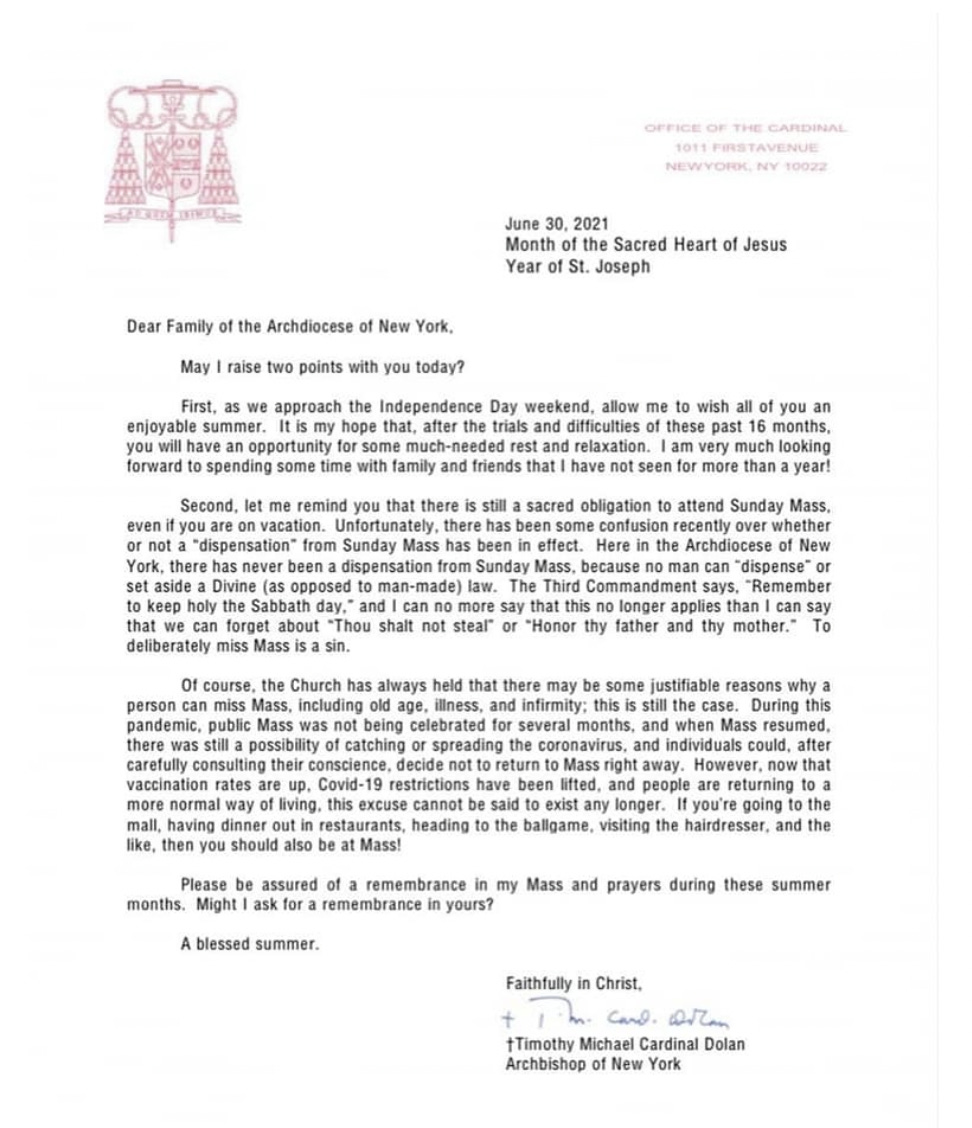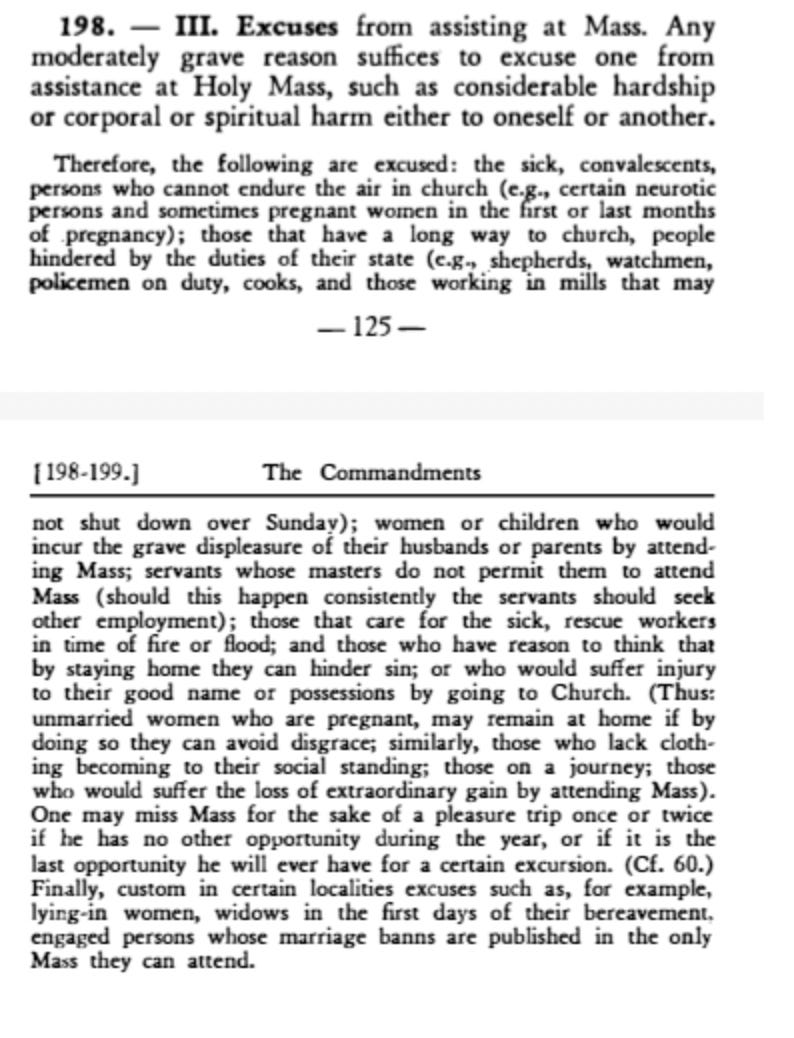Cardinal Timothy Dolan sent a letter to Catholic New Yorkers Tuesday, urging that they return to Sunday Mass “now that vaccination rates are up, Covid-19 restrictions have been lifted, and people are returning to a more normal way of living.”
The cardinal noted that he had never actually dispensed New York Catholics from the Sunday obligation, and said it isn’t in his power to do that.
Here’s what he wrote:
“Unfortunately, there has been some confusion recently over whether or not a ‘dispensation’ from Sunday Mass has been in effect. Here in the Archdiocese of New York, there has never been a dispensation from Sunday Mass, because no man can ‘dispense’ or set aside a Divine (as opposed to man-made) law. The Third Commandment says, ‘Remember to keep holy the Sabbath day,’ and I can no more say that this no longer applies than I can say that we can forget about ‘Thou shalt not steal’ or ‘Honor thy father and thy mother.’ To deliberately miss Mass is a sin.
But, of course, many bishops did issue dispensations from the Sunday obligation during the worst of the coronavirus pandemic. In some parts of the world those dispensations are still in effect.
So some readers of The Pillar have a question:
Is Cardinal Dolan right? Is a bishop really unable to dispense the Sunday obligation?
Not exactly. Or, more precisely, no.
The cardinal is correct that no Church authority can dispense from the obligations of divine law, including the Third Commandment. Here’s what it says:
“Remember the sabbath day, to keep it holy. Six days you shall labor, and do all your work; but the seventh day is a sabbath to the Lord your God; in it you shall not do any work.”
The Catechism of the Catholic Church explains the observation of this commandment in the life of the Church:
The celebration of Sunday observes the moral commandment inscribed by nature in the human heart to render to God an outward, visible, public, and regular worship ‘as a sign of his universal beneficence to all.’ Sunday worship fulfills the moral command of the Old Covenant, taking up its rhythm and spirit in the weekly celebration of the Creator and Redeemer of his people.
The Catechism also explains that “the Sunday celebration of the Lord's Day and his Eucharist is at the heart of the Church's life.”
It adds that because “the Sunday Eucharist is the foundation and confirmation of all Christian practice,” participation in Sunday Mass is a serious moral obligation.
But the Catechism notes there are exceptions to that obligation, which include Catholics with a serious illness or caring for a baby, and those “dispensed by their own pastor.”
A pastor can dispense from the Sunday Mass obligation. Canon 1245 of the Code of Canon Law says it directly:
“A pastor can grant in individual cases a dispensation from the obligation of observing [the Sunday obligation.]”
A diocesan bishop, it turns out, can do even more.
While a pastor can dispense “in individual cases” from the Sunday obligation, the diocesan bishop can dispense groups of Catholics, or the entire diocese, from the Sunday obligation.
That’s what happened in most dioceses across the United States last year.
Why can the bishop do that? For that matter, why can a pastor?
While observing Sunday is an obligation of divine law, the way we observe Sunday — by going to Mass — is matter of ecclesiastical law, set by the Church, and able to be dispensed by the Church’s authorities, according to the norms of canon law.
For his part, Cardinal Dolan says he never issued a dispensation from Sunday Mass in the Archdiocese of New York. But if you live there, and you couldn’t go to Mass because, let’s say, churches were closed and public Masses were cancelled, don’t fret. No one can be held to the impossible.
Which brings up another point…
“Serious reasons”
In his letter, Cardinal Dolan wrote that:
“the Church has always held that there may be some justifiable reasons why a person can miss Mass, including old age, illness, and infirmity; this is still the case. During this pandemic, public Mass was not being celebrated for several months, and when Mass resumed, there was still a possibility of catching or spreading the coronavirus, and individuals could, after carefully consulting their conscience, decide not to return to Mass right away. However, now that vaccination rates are up, Covid-19 restrictions have been lifted, and people are returning to a more normal way of living, this excuse cannot be said to exist any longer.”
Some readers have asked about that last part, that a threat from the coronavirus “cannot be said to exist any longer.”
Here’s their question:
Can people who live in the Archdiocese of New York still refrain from Mass if they are medically fragile and vulnerable to Covid-19?
Yes. The reason is because the Church says that discerning a “serious reason” not to attend Mass is a matter of personal conscience.
Cardinal Dolan’s letter gives pastoral advice about Mass attendance similar to that offered by a lot of bishops:
“If you’re going to the mall, having dinner out in restaurants, heading to the ballgame, visiting the hairdresser, and the like, then you should also be at Mass!”
While that seems a good criteria for discerning “serious reasons,” it also means that Catholics who are not yet going to the mall, a hairdresser, or a ballgame, because of medical fragility, care for unvaccinated medically fragile children or elderly adults, or because of some other serious reason might still discern that it’s not time to return to Mass.
The cardinal likely intended his advice in a general fashion, but the Church says that the serious and mature discernment of a “serious reason” to miss must be discerned by each individual and family, striving to avoid the temptations of both laxity and scrupulosity, while considering their unique circumstances.
This is an example of the way the Church informs the conscience without replacing it: the Church can give the general principles for discernment, but could never develop an entirely exhaustive list of what a “serious reason” to miss Mass actually is, especially since what’s “serious” for some may not be “serious” for others.
Still, a moral theology manual from 1962 — “Moral Theology,” by Heribert Jone, OFM, Cap. JCD, offers some advice on this discernment.
Be forewarned, some of this advice doesn’t jibe with contemporary cultural sensibilities — for example, the advice to unmarried pregnant women — but it does offer a sense of the way the question has traditionally been discerned:
It is worth remembering, of course, that moral theology manuals like this one were meant to help confessors discern whether someone had committed a mortal sin — not to give people an excuse to miss Mass. So let the reader beware.
Dispensations and vacation
Some readers of The Pillar have asked recently about their Mass obligation when on vacation. The question seems a bit complicated because they might be traveling from a place where the Mass obligation has returned, but to a place where the obligation is still dispensed.
The general rule of thumb is that travelers can follow the rules of the place where they live, or the place where they are.
Catholics traveling from a place where they have been dispensed usually remain dispensed, even if they’ve traveled to a place where Catholics are not dispensed.
And a Catholic who is not dispensed at home is usually understood to be dispensed when he is in a diocese where the Sunday obligation remains dispensed.
Commandment Three
The technical and canonical questions notwithstanding, Cardinal Dolan’s central point was the divine obligation to spend a day refraining from extraneous things, doing works of charity and generosity, giving God glory and worshipping him.
While — after a long absence — many Catholics are very glad to be back to Mass on Sundays, those who are not yet back at Mass are obliged — commanded by God, even, to spend the day in prayer and thanksgiving for the Creator of all things.
Here’s advice from the Catechism:
“Participation in the communal celebration of the Sunday Eucharist is a testimony of belonging and of being faithful to Christ and to his Church. The faithful give witness by this to their communion in faith and charity. Together they testify to God's holiness and their hope of salvation. They strengthen one another under the guidance of the Holy Spirit.”
…
“Those Christians who have leisure should be mindful of their brethren who have the same needs and the same rights, yet cannot rest from work because of poverty and misery. Sunday is traditionally consecrated by Christian piety to good works and humble service of the sick, the infirm, and the elderly. Christians will also sanctify Sunday by devoting time and care to their families and relatives, often difficult to do on other days of the week. Sunday is a time for reflection, silence, cultivation of the mind, and meditation which furthers the growth of the Christian interior life.”
…
“Sunday … is to be observed as the foremost holy day of obligation in the universal Church.”
Buona Domenica — Happy Sunday!






